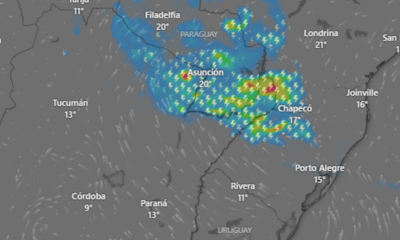INTERNACIONAL
Pilar Adón: “Yo no idealizo la naturaleza, no es Disney, no es abrazar árboles”

“Mi madre nació del lado de los ganadores y mi padre, del de los perdedores”, me va a decir, apenas empezamos a hablar la escritora española Pilar Adón. Y, claro, “el lado de los ganadores”, “el lado de los perdedores” y “escritora española”, da como resultado una familia atravesada por la Guerra Civil que vivió la Península entre 1936 y 1939 pero cuyos efectos no es seguro que se hayan acabado.
Sonríe Pilar Adón, está hablando del origen de esa escritura por la que, en 2023, ganó el Premio Nacional de Narrativa en España, con novelas como De bestias y aves, El mes más cruel y Las efímeras.
“Entonces -dice-, mi madre tuvo una educación formal, mi madre no pasó hambre nunca y mi padre al revés, mi padre nunca tuvo una educación formal y pasó hambre. Los dos nacieron un pueblo muy pequeño en el 41, acababa de terminar la Guerra Civil. Los dos son niños de posguerra. Y mi padre, para combatir el hambre de alguna manera, tenía la naturaleza”.
Adón dice esto porque empezamos hablando de De bestias y aves, esa novela suya en la que una mujer, agobiada, sale de Madrid con el autos, sale a manejar, se olvida el celular, se va perdiendo por caminitos, se queda sin nafta, ya es campo, hay un portón, toca, le abren. ¿Querrá salir? ¿Podrá salir?

Y hablamos de Las efímeras, donde también hay una comunidad, hay naturaleza, hay aislamiento, hay mujeres.
-Pero el campo, en vez de ser un lugar donde uno va a tener paz, en vez de ser el lugar del bien, es acechante, es amenazador…
-Es una manera de entender el aislamiento en la naturaleza. Siempre son mujeres que se aíslan en unas casas rodeadas de naturaleza. Y claro, no es una naturaleza domesticada ni ajardinada, es una naturaleza que yo conozco muy bien, porque es una naturaleza en la que me he criado.
Y entonces Pilar Adón habla del padre y la madre. La madre que va a la escuela, el padre que sale a conseguir algo para comer, todo en el mismo pueblo de Toledo. Un pueblo que se va vaciando hasta hoy, que tiene 50 personas. Del que ellos mismos se fueron, para instalarse en las afueras de Madrid.
-Además de las dos Españas, en mi familia, se da la contraposición entre mi madre y mi padre en otros aspectos. Mi madre sí leía, tenía una pequeña biblioteca en casa, me apuntó a inglés en cuanto pudo y gracias a eso soy traductora. Los libros que yo leía de chiquitita eran los libros que tenía mi madre. Y yo siempre miré el lado de mi madre, porque era más cómodo, más intelectual, por decirlo de alguna manera. Y nunca quise saber nada del mundo de mi padre.
-¿Por qué?
-Porque el mundo de mi padre era muy duro: era la matanza del cerdo para comer, salir de caza para comer. Lo que te digo, él pasó hambre. Entonces, yo ese mundo no lo quería de pequeña. Hasta que afortunadamente llegó un momento en mi vida en que me quité toda esa tontería de encima y empecé a mirar el lado de mi padre y me di cuenta de que era el cincuenta por ciento de mi vida, de mi sangre. Y empecé a descubrir su naturaleza, a irle detrás para que me enseñara a coger espárragos para comer, setas… la presencia de los perros, todo eso.

-Desde afuera cuando pensamos en España me parece que pensamos en Madrid, en Barcelona…
-Durante muchos años, en España la literatura predominante era una literatura muy urbana, muy de realismo social. Y yo estaba escribiendo de seres que se encerraban en casas rodeados de naturaleza. Y, de repente, hubo un movimiento en España, con la crisis económica brutal de 2008, en que hubo un movimiento en que la gente ya no podía vivir en las ciudades, no podía permitírselo. Las hipotecas eran una locura, no había manera de pagar nada. Y se volvieron al pueblo de los padres. Y surgió un movimiento que en España se llamó neorruralismo. Yo venía escribiendo toda mi vida de personas en casas en la naturaleza, parecía que estaba hecho a propósito para encajar en esa ética.
-Pero no es un alivio, es un clima tan opresivo el de la naturaleza y el pueblo que dan ganas de irse a la ciudad a respirar smog.
-Claro, porque yo no idealizo la naturaleza, no es Disney, no es ir a abrazar árboles. No son esas casas de turismo que llegas y están los leños cortados perfectamente en trocitos en una cestita de mimbre. Cuando era pequeña, viví este mundo nada idealizado. Yo me iba con mi abuela paterna a recoger al campo taramas, que es una palabra que ni en España se conoce. Las taramas son las ramas que caen de los árboles, que no tienes que estar cortándolas tú, sino que se caen al suelo. Y entonces íbamos mi abuela y yo, yo bien pequeña, y arrastrábamos taramas, estas ramas, a la casa para encender la lumbre. Cuando en la casa de mi abuela se encendía la lumbre el mejor lugar siempre era para mi padre, que era el hombre.
-Lo de la lumbre no se oye tan mal.
-Con la romantización de la naturaleza uno se imagina la lumbre, la manta y tal. Cuando tú estás frente al fuego, te estás abrasando por delante y lo de atrás está helado. Y en cuanto te levantas y te vas a otras partes de la casa donde no hay calefacción, hace un frío importante, las sábanas húmedas, todas estas cosas. Durante un tiempo yo no quise saber nada de eso, porque me iba a Madrid, había ascensor, había calefacción, había servicio y había agua caliente. Pero de pronto vi que en el mundo de mi padre estaba mi verdad.

-Y escribís sobre mujeres aisladas cerca de la naturaleza…
-Me he dedicado toda la vida a meter de manera voluntaria a los personajes femeninos en casas. Pero mi búsqueda es la libertad en esas casas, aunque parezca antitético, porque tú piensas en libertad y no piensas en encierro. Pero para mí era básico, a nivel biográfico y también y literario, librarme de imposiciones sociales. Si te casas, si no te casas, si tienes hijos, si no los tienes, si llevas el pelo bien, si llevas el pelo mal, qué van a pensar de ti.
-¿Y cuándo te liberaste de esas imposiciones?
-Con la edad.
-¿Con cuánta edad?
-Con mucha edad, con mucha edad, porque en mi casa era muy raro que yo como niña lo único que quisiera fuera leer y escribir. Lo que querían era que yo me relacionara con otros niños, que jugara. Mi abuela paterna me decía todo el rato “ajúntate”. Tienes que ajuntarte con otras niñas, y yo no quería juntarme, yo quería leer. Entonces, esas presiones, de alguna manera, me las he llevado a la literatura.
-Pensando en juntarse, en De bestias y aves lo que hay es una comunidad de mujeres y tampoco es Disney, un poco te protegen, un poco te ahogan, no se sabe si es algo bueno o malo.
-Yo no voy a hacer comunidades en que todas las mujeres sean buenas, una sororidad absoluta, de hermandad, no. La sensación en que hay una opresión de la cosa colectiva bajo la forma de una utopía. Es que a mí me interesan mucho las comunidades, yo las estudio desde una perspectiva aspiracional, pero aspiracional ideológicamente abierta, porque no creo que lo soportara. Y, además, me parece muy interesante cómo el individuo, cómo el ser humano, que es básicamente imperfecto, quiere formar sociedades perfectas. Y casi siempre fracasan, por no decir siempre.
-¿En qué estás pensando?
-Durante mucho tiempo estuve estudiando las comunidades utópicas del siglo XIX en Estados Unidos. Incluso publicamos un libro de Louisa May Alcott, la autora de Mujercitas, que se titula Fruitlands, que es como se llamaba la comunidad utópica que fundó su padre, Amos Bronson Alcott. Entonces, ella contaba cómo su padre fundó la comunidad, pero se dedicaba todo el día a filosofar, a ir a los pueblos, a dar charlas y no se dedicó a cultivar la tierra, a mirar qué iban a comer en invierno. Alguien tiene que trabajar. Alguien tiene que trabajar la tierra, preparar la comida, todo. Pues no se hizo y la comunidad duró nada. Empezó en verano y en invierno ya fracasó. Casi siempre fracasa y creo que no puede ser de otra manera, porque aparece el liderazgo, la ambición, los celos, todo.
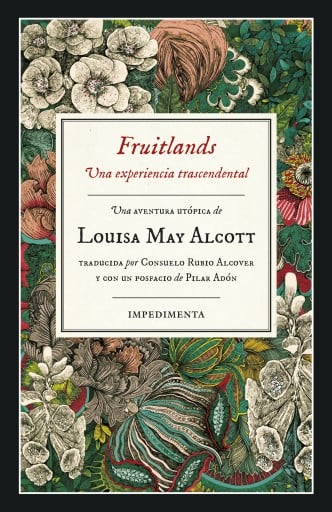
Fruitlands
eBook
-En esta época hay como un auge literario de las mujeres de tu generación, que hasta se reconoció con el Premio Nobel. Han Kang, que lo ganó, nació en 1970. Pero están Samanta Schweblin, Gabriela Cabezón Cámara, Sara Mesa, María Fernanda Ampuero.. Hace poco periodista cultura, exeditor, Juan Cruz, me decía que era porque a los varones les faltaba furia…
-No sé si les falta furia, pero es verdad que nosotras tenemos mucha hambre, por decirlo de alguna manera. Tenemos muchas ganas de contar, muchas ganas de salir, muchas ganas de que se nos lea. Es que si piensas en todo lo que hemos andado, pero todo lo que nos queda por andar… Hay mucho que contar desde nuestra perspectiva. Desde una mirada quizá lateral, una manera distinta de mirar. Mira, esto es algo tangencial, pero sirve para pensar: hablo con chicos y recién ahora han empezado a entender que nosotras pasamos miedo por la noche cuando vamos solas. Y esto es algo que ellos no sabían.
-Contar otro aspecto del mundo…
-Yo cuando salía de joven, que salía muy poco, mi hermano, que es tres años menor que yo, me decía que llevara las llaves así entre los dedos, en previsión de un posible ataque. Él no necesitaba hacer eso, yo sí. En literatura había ciertos textos que tú leías y te incomodaban. Y no sabías muy bien por qué, pero te incomodaban como mujer. Siempre éramos contadas, nosotras nunca contábamos. Siempre había un héroe que batallaba, se enamoraba, viajaba, y nosotras tejíamos y destejíamos, ¿no? Siempre éramos la excusa para que el héroe actuara. Y eso chirriaba. Entonces, ahora se trata de dar un poco la vuelta y ser nosotras las que contamos, las que viajamos, las que… somos libres para ver si nos quedamos en una casa o no.
INTERNACIONAL
Un zoológico en Dinamarca quiere alimentar a sus depredadores con tus mascotas
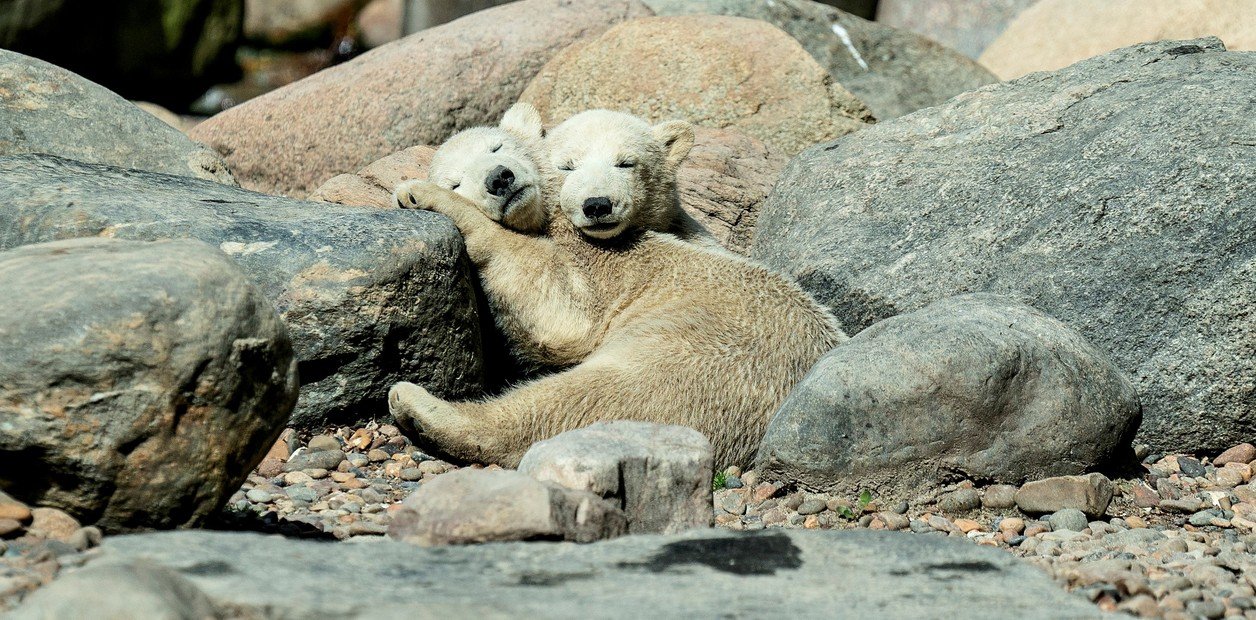
Posturas
INTERNACIONAL
WATCH: Trump says FBI ‘may have to’ help Texas round up AWOL Dem lawmakers
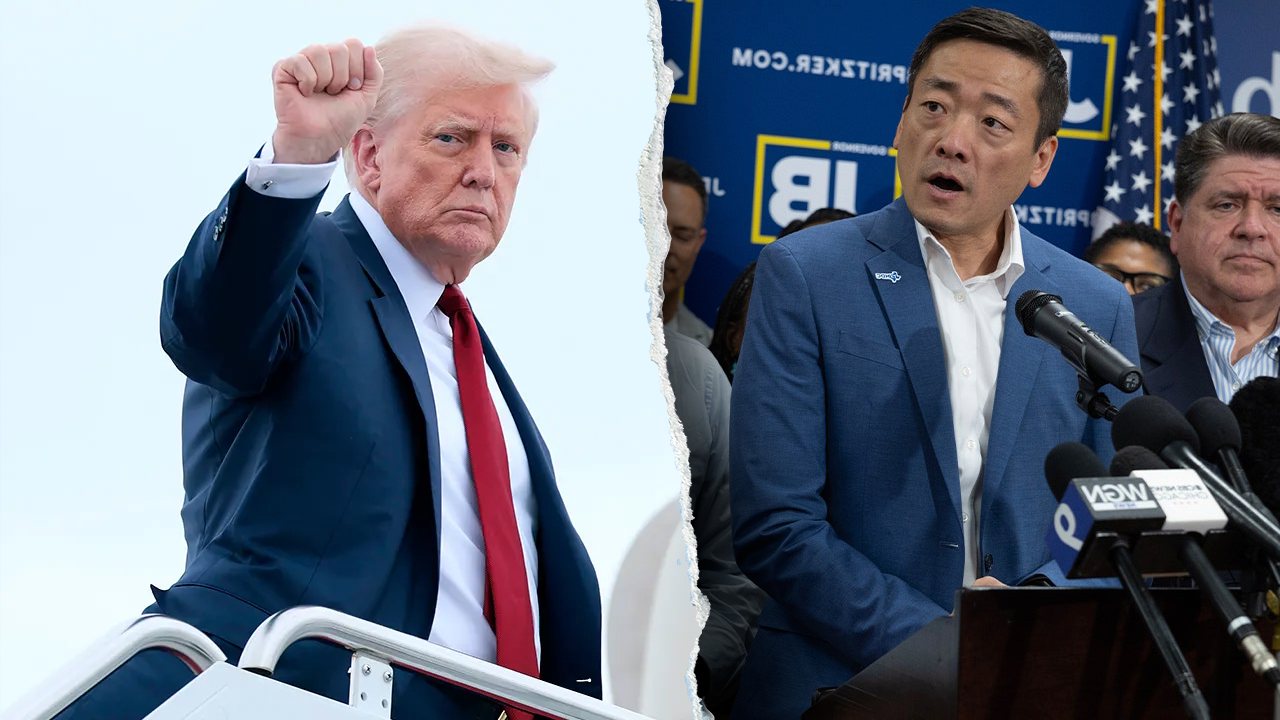
NEWYou can now listen to Fox News articles!
President Donald Trump said Tuesday evening that the FBI «may have to» round up a group of Democratic lawmakers who fled Texas to avoid voting on the state’s proposed redistricting map.
This comes as Texas Gov. Greg Abbott and several Texas leaders, including Attorney General Ken Paxton, have demanded that the 50 Democratic members of the state legislature who fled the state return or face consequences.
The Democrats fled the state in an effort to deny Republicans the necessary two-thirds quorum required to vote on the redistricting map, which would likely give the GOP an edge in elections and potentially add five House seats to the Texas Republican congressional delegation.
National Democrats have praised the stunt. During a press conference on Sunday, Illinois Gov. J.B. Pritzker, a leading Democratic figure, shared his support for the Texas Democrats, describing their departure as a «righteous act of courage,» while claiming Republicans want to silence «millions of voices, especially Black and Latino voters.»
FBI URGED TO LOCATE OR ARREST TEXAS DEMOCRATS WHO FLED STATE TO STALL REDISTRICTING VOTE
President Trump said Tuesday the FBI «may have to» round up Texas Democrats who fled the state to block a vote on redistricting. At right, the group speaks to the press after leaving. (Anna Moneymaker/Getty Images; Scott Olson/Getty Images )
Abbott said the lawmakers’ commitment to voting as elected state officials is a duty and is «not optional.» The governor also said a legislator determined to have «forfeited his or her office due to abandonment» can be removed from office under the Texas Constitution, thereby creating a vacancy, which the governor can «swiftly fill» under Article III, Section 13.
After the Democrats failed to meet Abbott’s 4 p.m. CT Monday deadline to return, Texas Speaker of the House Dustin Burrows announced he would sign arrest warrants against any absent Democrat lawmakers if authorized by a vote of the chamber. Shortly thereafter, the House did approve the warrants and Abbott then swiftly called on the Texas Department of Public Safety to arrest the «delinquent Texas House Democrats.»
The attorney general has stated that the lawmakers «should be found and arrested no matter where they go.»
Trump weighed in on the political intrigue Tuesday at the White House when he was asked by a reporter, «Do you want the federal government and the FBI to help locate and arrest these Texas Democrats who have left the state?»
‘ALL-OUT WAR’: FLEEING TEXAS DEMS SIDE WITH NEWSOM AS REDISTRICTING STANDOFF CONTINUES: ‘FIRE WITH FIRE’
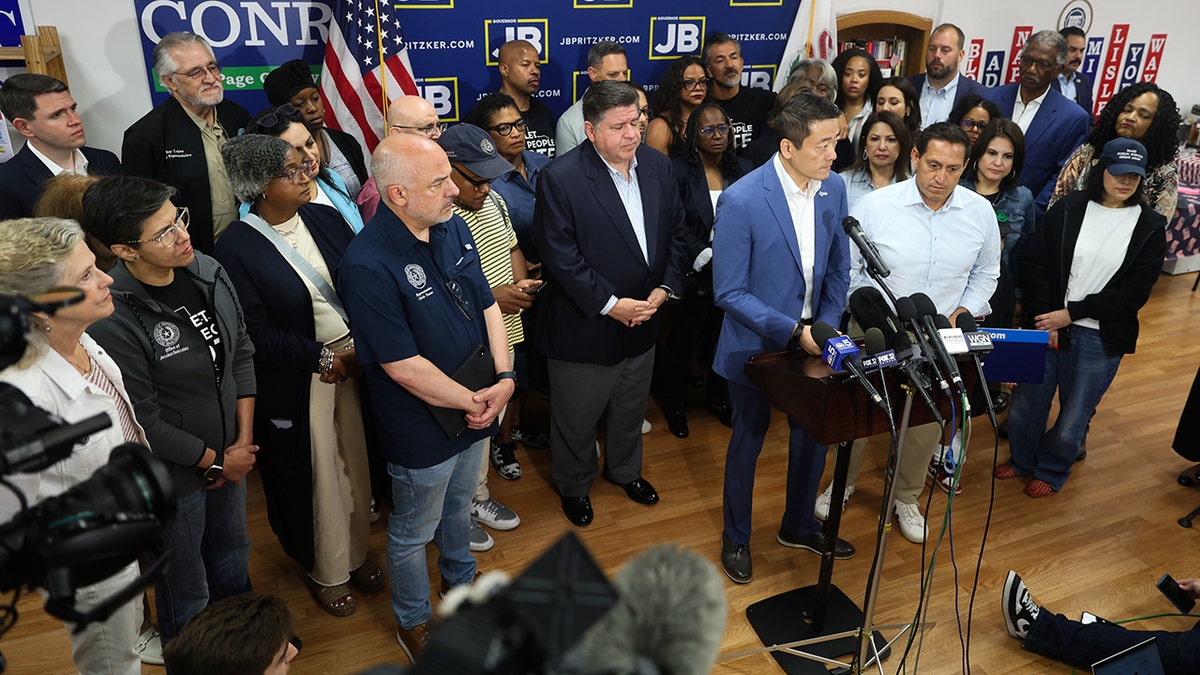
Texas House Democratic Caucus Chair Gene Wu speaks at a press event in Illinois after he and dozens of fellow lawmakers fled Texas to block a redistricting vote, Aug. 3, 2025. (Scott Olson/Getty Images)
The president responded that it is a bad look for Democrats to «abandon» the state rather than fight it out in the legislature.
«Well, I think they’ve abandoned the state,» he said. «Nobody’s seen anything like it, even though they’ve done it twice before. And, in a certain way, it almost looks like they’ve abandoned the state. Looks very bad.»
Pressed further on whether the FBI should get involved, Trump answered, «Well, they may have to.»
«They may have to,» he repeated. «No, I know they want them back. Not only the attorney general, the governor wants them back. If you look, I mean the governor of Texas is demanding they come back. So, a lot of people are demanding they come back. You can’t just sit it out. You have to go back. You have to fight it out. That’s what elections are all about.»
‘BUTTER KNIFE TO A GUNFIGHT’: DEMOCRATIC LAWMAKER RIPS HIS PARTY’S STRATEGY IN REDISTRICTING BATTLE
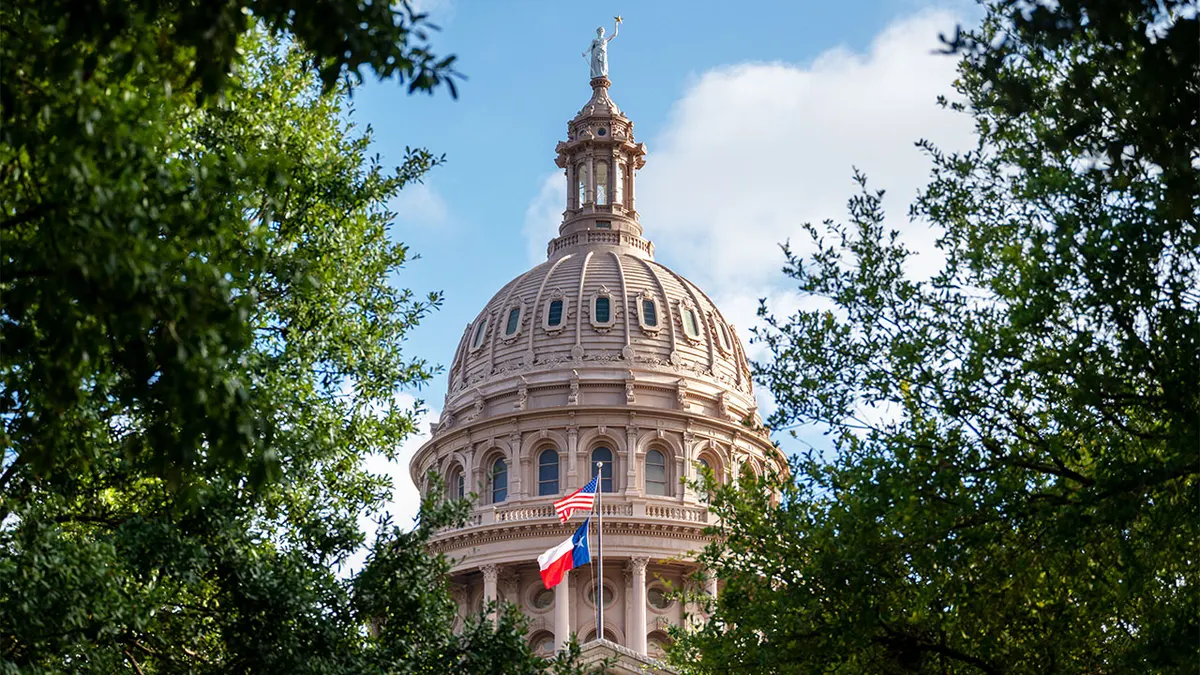
A view of the Texas State Capitol in Austin as the GOP-led redistricting session continues without dozens of absent House Democrats. (Brandon Bell/Getty Images)
Asked by Fox News Channel’s Peter Doocy whether he thought Texas’ redistricting plans were worth risking blue states similarly retaliating, Trump answered, «They’ll do it anyway.»
«Why, if we stop over there, they would have done it anyway,» he said. «Look, a lot of these states, you know, I watched this morning as Democrats are complaining and they’re complaining from states where they’ve done it, like in Illinois, like in Massachusetts.»
«The Democrats have done it long before we started. They’ve done it all over the place. They did it in New York. They did it in a lot of different states,» Trump went on.
CALIFORNIA GOV. GAVIN NEWSOM’S ‘HYPER-PARTISAN’ MAP IS ‘UNIQUELY CORRUPT,’ GOP LAWMAKER ARGUES

Texas Gov. Greg Abbott said lawmakers who fled the state may be removed from office and may also be liable to felony charges. (Montinique Monroe/Getty Images)
The president went on to praise Texas’ redistricting plans, saying, «There’s tremendous support for it.» He also praised Abbott, saying the future of the plans depends on him.
CLICK HERE TO GET THE FOX NEWS APP
«Texas is a place that’s done very well with a free enterprise kind of an attitude, with the exact opposite of what’s happening in New York with a communist mayor. And they know what they’re doing. And they’re doing the right thing,» he said. «So, we’ll see what happens. We have a wonderful governor in Texas. He feels strongly about it. It’s going to be up to him.»
Fox News Digital’s Elizabeth Pritchett and Alec Schemmel contributed to this report.
donald trump,texas,elections disputes,democratic party,greg abbott
INTERNACIONAL
Russia and China tick Doomsday Clock toward midnight as Hiroshima bombing hits 80 years

NEWYou can now listen to Fox News articles!
Wednesday marks the 80th anniversary of when the U.S. employed the first ever nuclear bomb over the Japanese city of Hiroshima, followed by the bombing of Nagasaki three days later on Aug. 9. But despite nearly a century of lessons learned, nuclear warfare still remains a significant threat.
«This is the first time that the United States is facing down two nuclear peer adversaries – Russia and China,» Rebeccah Heinrichs, nuclear expert and senior fellow at the Hudson Institute, told Fox News Digital.
Heinrichs explained that not only are Moscow and Beijing continuing to develop new nuclear capabilities and delivery systems, but they are increasingly collaborating with one another in direct opposition to the West, and more pointedly, the U.S.
TRUMP LIFTS VEIL ON US SUBMARINES IN WARNING SHOT TO KREMLIN IN ‘CLEVER’ REPOSITIONING MOVE
An aerial photograph of Hiroshima, Japan, shortly after the «Little Boy» atomic bomb was dropped in 1945. (Universal History Archive/UIG via Getty images)
«It’s a much more complex nuclear threat environment than what the United States even had to contend with during the Cold War, where we just had one nuclear peer adversary in the Soviet Union,» she said. «In that regard, it’s a serious problem, especially when both China and Russia are investing in nuclear capabilities and at the same time have revanchist goals.»
Despite the known immense devastation that would accompany an atomic war between two nuclear nations, concern has been growing that the threat of nuclear war is on the rise.
The bombings of Hiroshima and Nagasaki – which collectively killed some 200,000 people, not including the dozens of thousands who later died from radiation poisoning and cancer – have been attributed with bringing an end to World War II.
But the bombs did more than end the deadliest war in human history – they forever changed military doctrine, sparked a nuclear arms race and cemented the concept of deterrence through the theory of mutually assured destruction.
Earlier this year the Bulletin of Atomic Scientists moved forward the «Doomsday Clock» by one second – pushing it closer to «midnight,» or atomic meltdown, than ever before.
In January, the board of scientists and security officials in charge of the 78-year-old clock, which is used to measure the threat level of nuclear warfare, said that moving the clock to 89 seconds to midnight «signals that the world is on a course of unprecedented risk, and that continuing on the current path is a form of madness.»
TRUMP CONFIRMS 2 NUCLEAR SUBMARINES ARE ‘IN THE REGION’ TO COUNTER RUSSIA
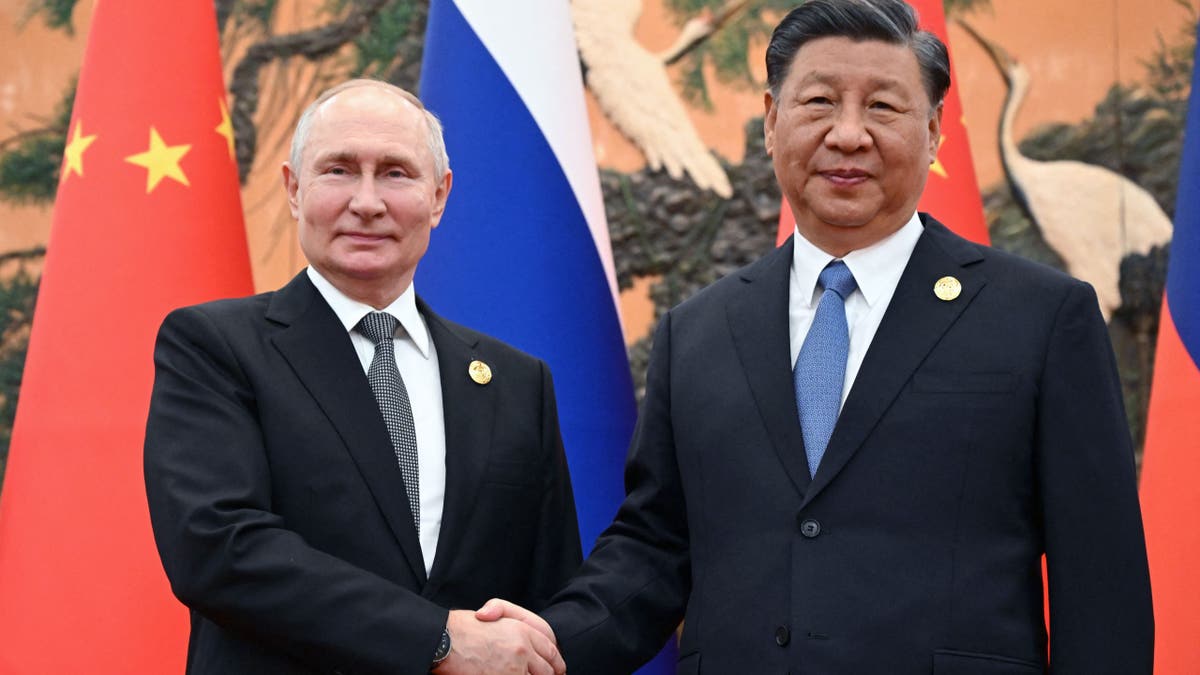
Russia’s President Vladimir Putin and Chinese President Xi Jinping shake hands during a meeting in Beijing on Oct. 18, 2023. (Sergei Guneyev/Pool/AFP via Getty Images)
Despite the escalated nuclear threats coming out of North Korea, and international concern over the Iranian nuclear program, the threat level largely came down to the three biggest players in the nuclear arena: Russia, the U.S. and China.
The increased threat level was attributed to Russia’s refusal to comply with international nuclear treaties amid its continuously escalating war in Ukraine and its hostile opposition to NATO nations, as well as China’s insistence on expanding its nuclear arsenal.
But the Bulletin, which was founded by scientists on the Manhattan Project in 1945 to inform the public of the dangers of atomic warfare, also said the U.S. has a role in the increased nuclear threat level.
«The U.S. has abdicated its role as a voice of caution. It seems inclined to expand its nuclear arsenal and adopt a posture that reinforces the belief that ‘limited’ use of nuclear weapons can be managed,» the Bulletin said. «Such misplaced confidence could have us stumble into a nuclear war.»
But Heinrichs countered the «alarmist» message and argued that deterrence remains a very real protectant against nuclear warfare, even as Russia increasingly threatens Western nations with atomic use.
«I do think that it’s a serious threat. I don’t think it’s inevitable that we’re sort of staring down nuclear Armageddon,» she said.
CHINA’S GROWING NUCLEAR ARSENAL AIMS TO BREAK US ALLIANCES AND DOMINATE ASIA, REPORT WARNS
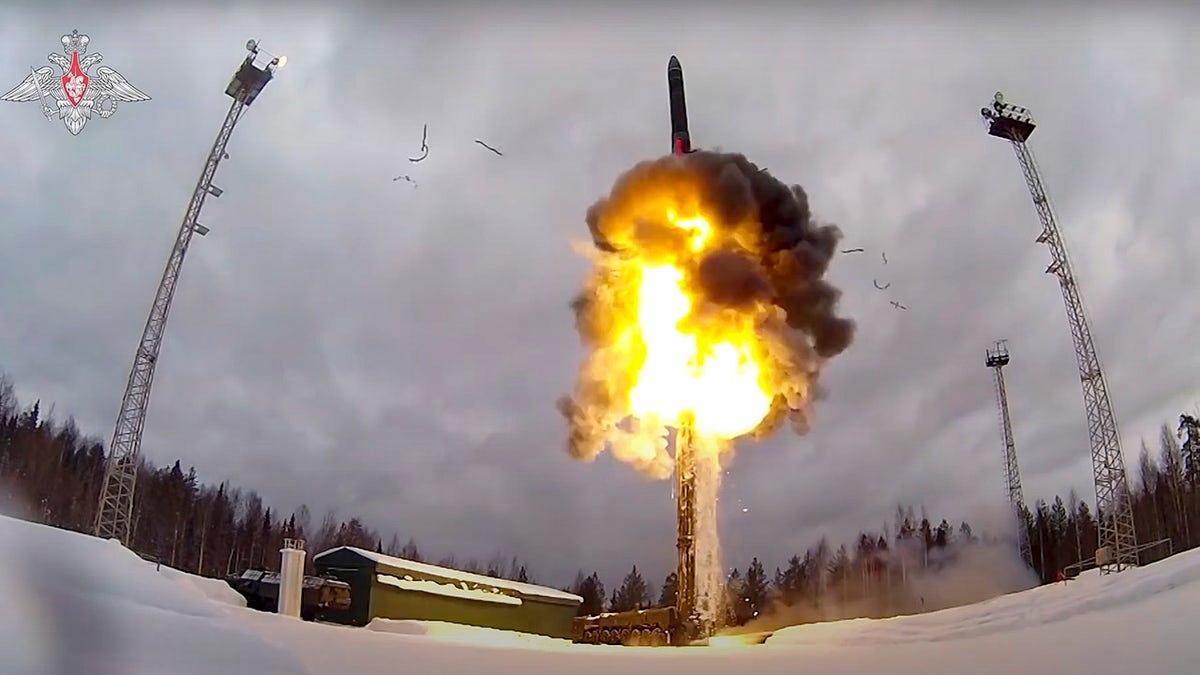
A Yars intercontinental ballistic missile is launched from an air field during military drills in Russia on Feb. 19, 2022. (Russian Defense Ministry Press Service via AP, File)
Heinrichs argued the chief threat is not the number of nuclear warheads a nation possesses, but in how they threaten to employ their capabilities.
«I think that whenever there is a threat of nuclear use, it’s because adversaries, authoritarian countries, in particular Russia, is threatening to use nuclear weapons to invade another country. And that’s where the greatest risk of deterrence failure is,» she said. «It’s not because of the sheer number of nuclear weapons.»
Heinrichs said Russia is lowering the nuclear threshold by routinely threatening to employ nuclear weapons in a move to coerce Western nations to capitulate to their demands, as in the case of capturing territory in Ukraine and attempting to deny it NATO access.
Instead, she argued that the U.S. and its allies need to improve their deterrence by not only staying on top of their capabilities but expanding their nuclear reach in regions like the Indo-Pacific.
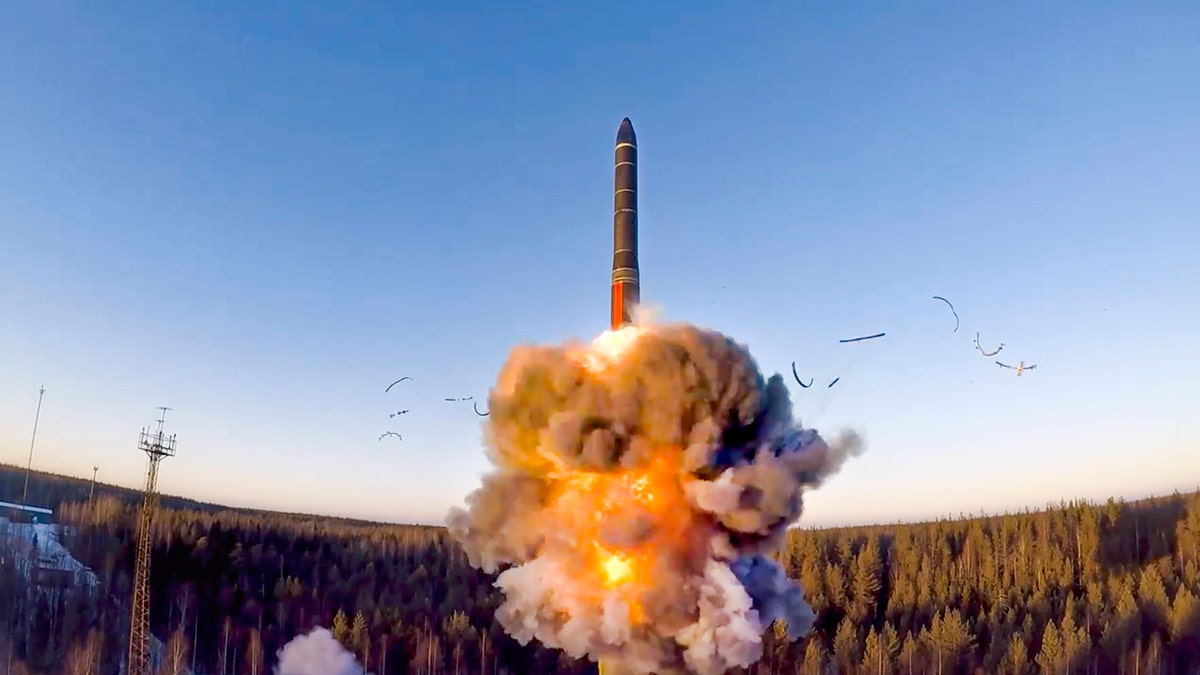
A rocket launches from missile system from the Plesetsk facility in northwestern Russia on Dec. 9, 2020. (Russian Defense Ministry Press Service via AP, File)
CLICK HERE TO GET THE FOX NEWS APP
«The answer is not to be so afraid of it or alarmed that you capitulate, because you’re only going to beget more nuclear coercion if you do that,» she said. «The answer is to prudently, carefully communicate to the Russians they are not going to succeed through nuclear coercion, that the United States also has credible response options.
«We also have nuclear weapons, and we have credible and proportional responses, and so they shouldn’t go down that path,» Heinrichs said. «That’s how we maintain the nuclear peace. That’s how we deter conflict. And that’s how we ensure that a nuclear weapon is not used.»
nuclear proliferation,russia,china,world war two,defense,world

 SOCIEDAD2 días ago
SOCIEDAD2 días agoHay alerta amarilla por tormentas y frío extremo para este lunes 4 de agosto: las provincias afectadas

 POLITICA1 día ago
POLITICA1 día agoMilei afirmó que la elección en la provincia de Buenos Aires “podría significar el fin del kirchnerismo”

 POLITICA1 día ago
POLITICA1 día agoMartín Menem se refirió al escándalo de Tech Security que involucra a su familia: “Nos quieren meter a todos en la misma bolsa”



















